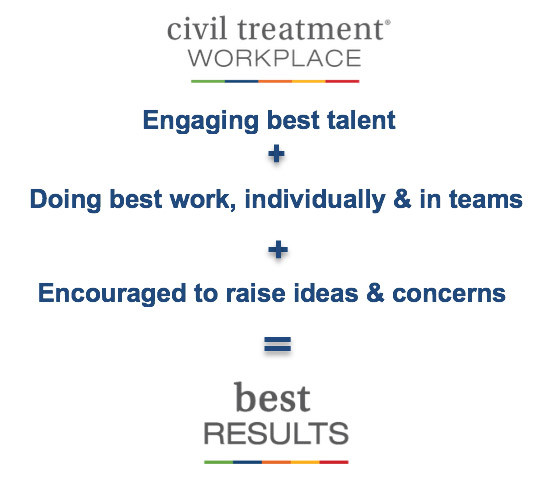Turn on the TV, go online, read a newspaper today or tomorrow and you’ll find stories or forums about the decline of civility in politics, at sporting events or in our workplaces. As important as the subject is, what’s often not considered is that civility is variable — it has different meanings in each of these and many other settings. Think about how we act while participating in services in a house of worship as opposed to sitting in the stands at a pro football game. Expectations of civil conduct vary, don’t they?
In most of our workplaces, differences in backgrounds and views on important issues likely exist. Depending on how and whether they’re managed, they can either be useful and enriching or divisive, if not destructive. Ask Google’s leaders—who just released a new civility policy following a well-publicized and disruptive incident—if they wish they had addressed this issue earlier, before it harmed its workplace reputation.

From our experience, a workplace civility initiative should be more than a policy—it should be conceived as value-linked imperatives put in place to help drive the best results. Operational outcomes are a unifying, compelling concept even for those who distrust the idea of civility often explicitly or implicitly considering it a “squishy” or “soft skill” matter interfering with their ability to get their work done. To that end, whenever I speak to groups of leaders and/or employees considering civility issues, I ask three questions.
First, “who here does their best work when you are insulted, demeaned, ignored, embarrassed, or humiliated or when your personal characteristics and views rather than your work record, abilities are used to define you?” I have yet to see a single individual raise their hand or nod their head.
Second, “Is finding out about new ideas and problems important to your business?” This time everyone signals yes.
The last question, “Do you think anyone in your organization will tell a colleague or boss about either a great and different innovation or a potentially important concern if they believe they might be ostracized, belittled or retaliated against for speaking up?” No hands go up or heads nod yes on this one. Whether they are executives, managers, or frontline employees, these questions help those in the audience make the connection between the way people are treated in the workplace and the best outcomes their organizations expect.

While generating thought and conversation is a good way to get a dialogue started and address conceptual resistance to civility principles, it’s not enough. Often in our fast paced, data rich lives great discussions and moving personal stories are quickly forgotten. Keeping civility alive requires a conscious process, like efforts launched to drive higher sales, increase quality standards or improve safety.
Keeping civility alive requires a conscious process, like efforts launched to drive higher sales, increase quality standards or improve safety
Just as anecdotes and conversations are useful but not enough. To deliver a lasting change a workplace civility initiative won’t take hold simply by issuing well written policies and mandating once a year training sessions. Instead, organizations need to look to their values and identify a few specific, clear behaviors that define daily interactions, and how differences are raised and resolved so they become consistent, cultural practices. Overall, the goal should be for civility initiatives to help organizations: find and engage the best team members drawn from a wide pool of candidates; do their best work individually and in teams and receive feedback, ideas and concerns sooner rather than later to help drive their enterprises forward and escape what could be avoidable catastrophes.
So, how should an initiative be defined? In our view and terminology, it’s an equation that we state using our Civil Treatment® language.

For this equation to work it has to be “proved” so even “disbelievers” understand how it will help their work succeed. Finally, for it to produce enduring results, the terms applied must be applied to everyone.
We can’t escape the charged nature of our times. But in each of our organizations, which has common values and missions, we can build relationships that foster teamwork and help produce the best business outcomes. When we do this, we’ll also build bridges that can extend beyond the contours of our own workplaces. To learn more about how to create lasting change and improve workplace civility in your organization, beyond policy changes, contact our employee training experts at ELI.


great article. i attended one of your courses this spring, civility in the workplace will pay huge dividends morale, retention and overall productivity. I just read a 14 page white paper on toxic workplaces published by UNC Keenan-Flagler Business School, a great read. http://execdev.kenan-flagler.unc.edu/blog/effective-leadership-can-prevent-toxic-culture